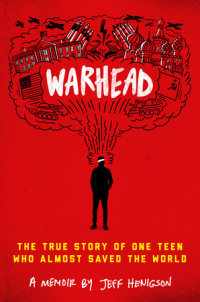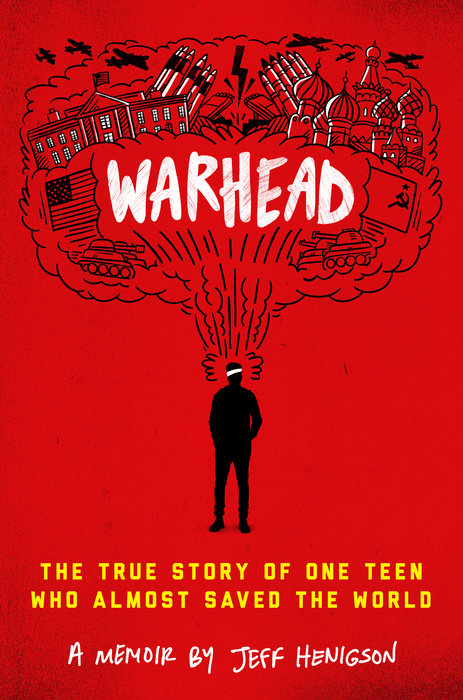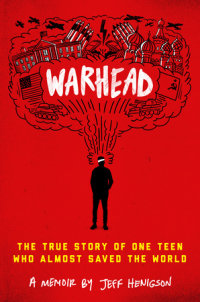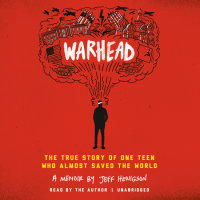Warhead
An often hilarious and always relevant memoir about one teen boy's battle with brain cancer and his Starlight Children's Foundation wish: to meet Mikhail Gorbachev in Russia and plead for nuclear disarmament and world peace.
It's 1986, and Jeff is an average fifteen-year-old: he thinks a lot about dating, he bounces around with his friends, and he's trying his hardest to get a car. Conversely, the world around him feels crazy: the United States and the Soviet Union are at glaring odds, with their leaders in a standoff, and that awful word, "nuclear," is on everyone's mind. Then, boom--Jeff learns that he has brain cancer and it's likely terminal. Well, that puts a damper on his summer plans and romantic prospects, doesn't it?
Jeff's family rallies around him, but they are fiercely complicated--especially Jeff's father, a man who can't say "I love you" even during the worst of Jeff's treatment. So when the Starlight Children's Foundation offers to grant Jeff a wish, he makes one certain to earn his father's respect: he asks to travel to Moscow and meet with Mikhail Gorbachev to discuss nuclear disarmament and ending the Cold War. Nothing like achieving world peace to impress a distant father, right? Jeff has always been one to aim high.
Jeff's story is dark, but it's also funny, romantic, and surprising. As his life swings from incredibly ordinary to absolutely incredible, he grapples with the big questions of mortality, war, love, hope, and miracles.
"A sweet but unsentimental account of a truly fascinating nuclear childhood. Henigson had me at 'Gorbachev.'" --Gary Shteyngart, New York Times bestselling author of Little Failure and Lake Success
"It's a tale well-told--always gripping, often heartbreaking, and ultimately uplifting." --Booklist
An Excerpt fromWarhead
The traffic lights on Colorado Boulevard were timed so well that even on a bike you could get through six or seven of them without stopping. You couldn’t do that the first time you rode, of course, but I’d been cruising down that boulevard every single day since ninth grade let out, racing six miles from my home in South Pasadena to C&H Surplus to see if any new parts had come in for my laser project. By then I could practically make it through those intersections with my eyes shut. It was hot out, your typical Southern California summer, but the breeze that formed from me biking so fast was cooling.
My laser project wasn’t just me geeking out. There was an actual point to it: to help get me into space. Kids think the only way to become an astronaut is to start out as a pilot, but Dad told me studying science was a much better route. “Pilot astronauts may get you into space,” he said, “but once there, it’s the science astronauts who do the more substantive work.” The project would look good on my applications to Caltech and MIT--maybe enough to help them ignore how badly I’d blown freshman chemistry.
I was coming up on Allen Avenue, where my buddy Paul lived. His dad, a Caltech scientist, was trying to get one of his experiments brought up on the next space shuttle mission. Paul had been gone most of the summer, which, considering the fact he was my best friend, had made life a little boring.
Lucia popped into my head then. She’d been out of town, too, which was probably good if I was to have any chance of getting my project completed. We’d made out last summer, just after they let us out of eighth grade.
I pedaled harder now, smiling with Lucia on my mind as I soared down the boulevard. As I entered the intersection, I looked across it to see a van quickly approaching from the opposite direction. Its left turn signal was switched on, but it didn’t seem to be slowing.
Frantically, I grasped my brake levers, which locked my wheels, causing my tires to lay down a straight black line. I could see the driver now, a middle-aged woman, her eyes elsewhere, as she swung her van into a turn.
There was nowhere for me to go.
Deep in my gut, there was a crushing panic. The last thing I remembered was flying.
Something that drove me up the wall was all the people telling me how lucky I was to have survived getting smacked by that van. Give me a break, I thought. If I’d actually been lucky, the lady wouldn’t have splattered me in the first place.
Huntington Hospital just happened to be the hospital where I was born--exactly fifteen years, four months, and twenty-two days before that lady almost ended my life. After the crash, three people at the hospital told me about my good fortune. The only one I didn’t feel like punching was the really cute nurse with the blondish-brown hair who was standing over me when I first woke up. Actually, until she opened her mouth, I thought it was Lucia hovering over me. But then the lady spoke--“It looks like somebody’s awake”--and it definitely wasn’t Lucia’s voice.
“Where am I?” I mumbled.
“You’re in an emergency room.” I glanced down at my arm, tracing the tube sticking out of it to a bag hanging on a pole next to my bed. An electronic box below the bag was beeping. I kind of instinctively sniffed at the room, but there were plastic tubes in my nostrils. “You were in an accident,” the nurse continued. I remembered the van crossing in front of me, but that was it. “Can you tell me your name?”
“Jeff.”
“Do you know what year it is?”
“It’s 1986.”
“And do you know who our president is?”
“He’s an actor.”
She laughed and told me I was at Huntington Hospital. After several more questions, she asked for my parents’ names and their phone numbers. I gave her everything and she said, “You really are lucky, you know?”
“Maybe I would be if you gave me your phone number,” I said. She was still laughing when I fell back asleep.
The next time I opened my eyes, my father, who happened to be a modern-day replica of Abraham Lincoln, was standing at the foot of my hospital bed. He really did look just like Lincoln, from his wrinkled forehead to his long, broad nose to his scraggly beard. On Halloween five years earlier, my dad had opened the door in the same suit he’d worn to work that morning and a little girl said, “Trick or treat, Mr. Lincoln!”
Dad didn’t rush over and hug me. He just stood there, his eyes focused in on mine, as I blinked a few times.
“How are you feeling, son?” he said. My body was aching everywhere.
“Like I just got hit by a van.” I kind of wanted a hug. “Where’s Mom?”
“They weren’t able to reach her. They’re going to release you shortly, so you’ll see her soon.” I nodded. “The good news is you don’t have a significant head injury.” Just like the nurse, he went on to tell me how lucky I was.
He didn’t actually use the word “lucky.” He said I was “fortunate.” Grandma told me once that my dad never used a two-syllable word when there was a synonym that was longer. The result was that he always sounded professorial--exactly the kind of word he’d use. He was also pedantic, which happened to be one of my favorite words because it described him perfectly. He was so nitpicky about language that you couldn’t make it through a story without being interrupted--and corrected--at least once. My cousin said that was just the way lawyers were, but half of my friends had lawyers as parents, and none of them spoke like that.



